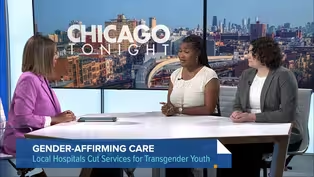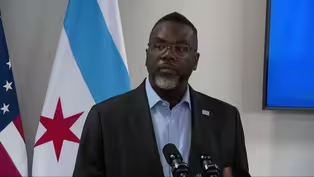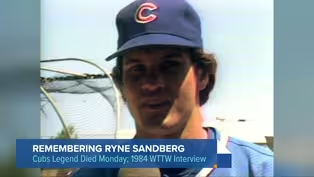
Fire at North Side Homeless Encampment Reignites Safety Concerns
Clip: 7/29/2025 | 7m 26sVideo has Closed Captions
Officials are planning to remove the encampment along the North Shore Channel.
Chicago Fire Department officials said there were no apparent injuries, but they weren't sure how many unhoused people were displaced.
Problems playing video? | Closed Captioning Feedback
Problems playing video? | Closed Captioning Feedback
Chicago Tonight is a local public television program presented by WTTW
WTTW video streaming support provided by members and sponsors.

Fire at North Side Homeless Encampment Reignites Safety Concerns
Clip: 7/29/2025 | 7m 26sVideo has Closed Captions
Chicago Fire Department officials said there were no apparent injuries, but they weren't sure how many unhoused people were displaced.
Problems playing video? | Closed Captioning Feedback
How to Watch Chicago Tonight
Chicago Tonight is available to stream on pbs.org and the free PBS App, available on iPhone, Apple TV, Android TV, Android smartphones, Amazon Fire TV, Amazon Fire Tablet, Roku, Samsung Smart TV, and Vizio.

WTTW News Explains
In this Emmy Award-winning series, WTTW News tackles your questions — big and small — about life in the Chicago area. Our video animations guide you through local government, city history, public utilities and everything in between.Providing Support for PBS.org
Learn Moreabout PBS online sponsorship>> First off tonight, a homeless encampment along the North Shore Channel is being removed.
It comes following a fire at the encampment yesterday.
That's reigniting safety concerns.
Fire officials say there were no apparent injuries but were unsure.
How many unhoused people were displaced.
9th Ward Alderwoman Samantha Nugent told residents in an email yesterday that the park district will be moving forward with the closure of the encampment.
The incident comes amid the Trump administration's new executive order directing state and local governments to crack down on the unhoused community.
Joining us is Duck Schenkel Berg executive director of Chicago Coalition to End Homelessness to thank you for joining us.
Thanks, Ryan.
So fires are not uncommon in and around homeless encampments.
So why are encampments more prone to fires?
You know, folks who are living in encampments are doing what they can to survive.
And so >> and that might be cooking outside and, you know, be trying to stay warm.
Obviously this time of year isn't it isn't the case of that.
But there's a lot of different reasons why fires might start.
We don't know what happened at this encampment, but it is a safety issue to and sometimes we don't know that this was related necessarily in this instance.
But sometimes propane tanks were found at homeless encampments for use, like you said, keeping warm cook, cooking foods.
>> I'm in a statement the city said it is planning a more comprehensive cleaning of the encampment.
What does that mean and what does it mean for the people living there?
So, you know, I don't speak on behalf of the city.
What we've heard seen in the past when they talk about comprehensive cleans, it means.
>> Coming in with heavy equipment coming in remove.
Unused tense debris, things like that.
We hope that they keep with what they've done in the past, which is allow people to move back after that clean.
It's So hope to have a conversation with the city about, but specifically their plans are.
And we did invite the city for this conversation tonight as well.
And like you said, typically in the past, the city has said it is it's a matter of >> public health and public safety to those areas need to be clean.
But of course, there are concerns for the folks who live there being able to come back and also not losing all their belongings.
right the Chicago Coalition to end homelessness.
You all, of course, who helped to House displaced residents.
Part of your work considering what we know about the housing shortage in the city.
How do you do that?
How are you getting people into housing?
So it's really difficult right the number of people experiencing homelessness in our city incredibly high and keep scrolling the latest point in time.
Count.
>> Show that there was a 38% increase number of people who are experiencing homelessness.
And that's looking people in shelters and are unsheltered.
And that's on top of a 25% increase last year.
So we see the demand to grow and the supply not growing.
there's and real draconian threats to the existing housing funding.
So right now we're in a really tough spot, whether it's the city, the state or the federal government.
25 1% last year.
38 1% this year.
What do you think causing that increase?
I think the fundamental thing is that we don't have enough affordable housing, homelessness as a housing problem and between stagnant wages and an affordable housing.
Many people are one to 2 paychecks away from experiencing homelessness.
And that's what we're seeing in terms of this group.
>> So last week, President Donald Trump, he signed an executive order called ending Crime and disorder on America's streets, which among other things it seeks to revive, quote, civil commitment through.
That's the process of placing individuals with mental health issues in treatment without their consent.
Your organization has denounced this executive order.
Why do you oppose it and is absolutely what we should not be doing when it comes to homelessness.
>> go turns its back on the best practices that we know work.
Models like housing first or harm reduction, which are incredibly effective at moving people from experiencing homelessness to being state of housing remaining stably housed it, removes people's rights.
We shouldn't be involved.
Turning committing any one, too, institutions, you struggling with mental health issue, struggling with substance, use issues.
That is something we see throughout our society and we shouldn't be treating people experiencing.
Homelessness is though that there are poor because they're dealing with those issues.
What we should be doing with this administration should be to mean is focusing on best practices creating more housing opportunities get people out of homelessness and keep them out.
>> But who would most likely be affected or who's most likely to be most affected by an order like this one?
Well, you know, depending on how things play out and we don't know, you know, I suspect that there's an opportunity legal challenges to the order.
>> It's not really sure how you actually implement a lot of the pieces of this order.
But, you know, it's individuals who unsheltered who are at risk of, you know, summarily being removed from the streets, not because they're going to getting housing but being they want to take them out of the line of sight for people of color, more likely unfortunately up act and yet people of color.
You know, what we see in Chicago is.
>> Roughly 70% of people experiencing homelessness are black make up about 29% of the population are also there's a huge mismatch there.
Whole host of marginalized groups that this administration has called that after are disproportionately impacted by homelessness, immigrants be that the LGBTQ community be a black and brown folks.
They're all being hit even harder with this executive order.
>> This order would also shift funding away from housing first practices like the ones being used in Chicago.
What do we know about those and how they What they do is they meet people where they're at.
They recognize that the ability address the issues that people are dealing with, whether it's mental health, whether it's chronic health issues, whether substance use issues.
>> Those things are much easier to deal with someone stably housed.
So you don't put conditions on people moving at housing, you get them into permanent housing and then you providing the services they need to address that whole host of issues that works.
It is been studied nauseum that shows that people stay house when they get that.
So the types of barriers that the Trump administration is trying to put up trying to acquire surprise.
84, you've access to housing to require using medications we heard about access to housing.
This is the exact wrong way for us to be going on in effect.
>> Yesterday we reported that residents living near the encampment in housing have long-running concerns about encampment Legion Park.
Some mentioned feeling unsafe because of drug use in the area.
The occurrence of fires littering other nuisances are dangers.
What do you say to those residents?
So why not speak to their experiences are, you try >> repeat their experiences.
I will say is I hope that, you know, they will see what we see, which is that the way that we address this that we help people move out of encampments, reducing cam more housing and that we can work with to advocate for increasing housing supply services because that's really the only way that we're going to you move ourselves out of homelessness, that we're going to see the elimination of encampments is by really investing in the true solutions rather than peanuts
Advocates Push Back Against Cuts to Gender-Affirming Care for Youth
Video has Closed Captions
Clip: 7/29/2025 | 9m 41s | A number of hospitals have cut gender-affirming health care for transgender minors. (9m 41s)
Johnson Says New Taxes for Big Companies ‘On the Table’
Video has Closed Captions
Clip: 7/29/2025 | 2m 52s | The Chicago mayor's administration is preparing to confront a likely budget deficit of $1.2 billion. (2m 52s)
Ryne Sandberg Appears on WTTW's 'Time Out' in 1984
Video has Closed Captions
Clip: 7/29/2025 | 3m 8s | The Hall of Fame second baseman and former Chicago Cubs player died at 65. (3m 8s)
Providing Support for PBS.org
Learn Moreabout PBS online sponsorship
- News and Public Affairs

Top journalists deliver compelling original analysis of the hour's headlines.

- News and Public Affairs

FRONTLINE is investigative journalism that questions, explains and changes our world.












Support for PBS provided by:
Chicago Tonight is a local public television program presented by WTTW
WTTW video streaming support provided by members and sponsors.


